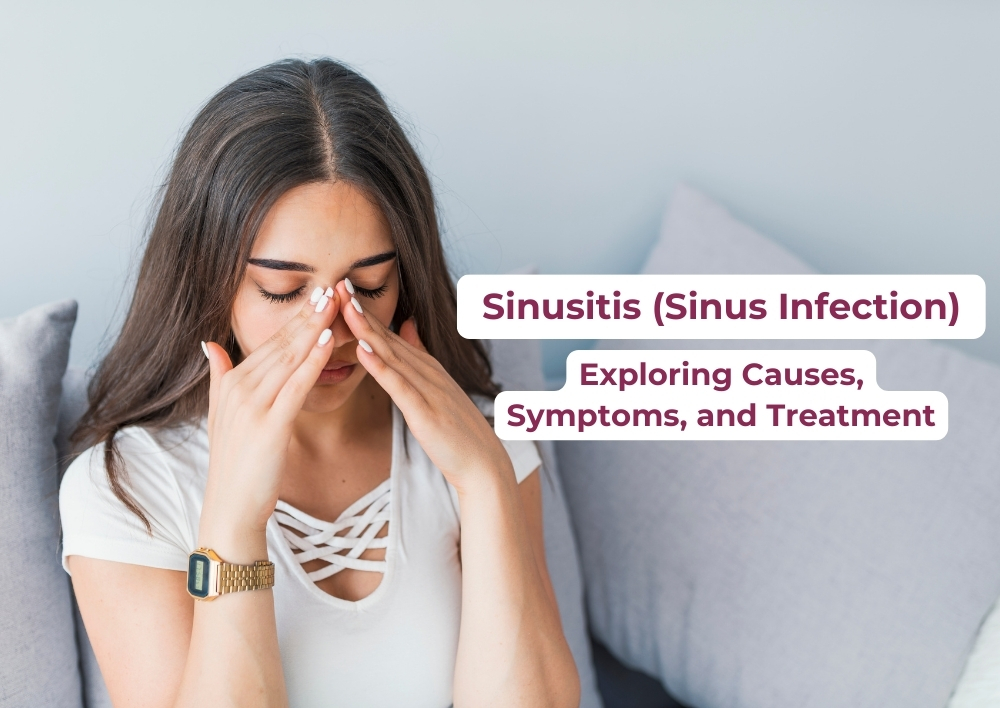Sinusitis (Sinus Infection): Exploring Causes, Symptoms, and Treatment
Do you ever feel like you're carrying around a heavy cloud in your head? Or experience that frustrating pressure behind your eyes that just won't go away? If so, you might be intimately familiar with sinusitis, a condition that affects millions worldwide and is usually misconceived as just another cold. Understanding sinusitis is the first step toward relief and getting the clarity you deserve.
What is Sinusitis?
Sinus infection, often referred to as sinusitis, occurs when the tissues lining the sinuses become inflamed or infected. Sinuses are the hollow cavities behind your cheeks, forehead, nose, and eyes that are normally filled with air, but when they get blocked and filled with fluid, bacteria, viruses, or fungi can grow and cause an infection. This can lead to symptoms ranging from mild discomfort to worsening pain.
Types of Sinusitis
According to the best ENT doctor in Gurgaon at Miracles Apollo Cradle/Spectra, sinusitis can be classified into several types based on its duration and the nature of the inflammation:
-
Acute Sinusitis: Typically lasts up to 4 weeks and is often triggered by a cold or allergies.
-
Subacute Sinusitis: This lasts from 4 to 12 weeks and may follow acute sinusitis that hasn't resolved completely.
-
Chronic Sinusitis: Lasts more than 12 weeks despite treatment attempts. It may be caused by an infection or by growth in the nasal polyps.
-
Recurrent Sinusitis: Includes various acute attacks of sinus infection within a year.
Symptoms to Watch
For Recognizing the symptoms of sinus infection can help you seek treatment early, preventing complications and discomfort. Common symptoms include:
-
Facial Pain or Pressure: A dull, constant ache around the eyes, forehead, or cheeks or upper teeth.
-
Nasal Congestion: Difficulty in breathing through the nose due to blockage or swelling of the nasal passages.
-
Discolored Nasal Discharge: Thick yellow, green, or cloudy discharge from the nose or down the back of the throat.
-
Loss of Smell: Partial or complete loss of the sense of smell.
-
Cough: Often worse at night, this may be caused by postnasal drip irritating the throat.
-
Facial Swelling: Swollen forehead, eyes, or cheeks.
-
Bad Breath: Foul-smelling breath due to nasal discharge.
-
Fatigue: Feeling tired or generally unwell.
-
Fever: Sometimes, especially in acute sinusitis, there may be a low-grade fever.
-
Ear Pain: Pressure changes in the sinuses can affect the ears, leading to earache or a feeling of fullness in the ears.
-
Dental Pain: Inflammation of the maxillary sinuses can sometimes mimic dental pain.
These symptoms can vary in severity and duration depending on whether the sinusitis is acute or chronic. It's important to consult an ENT Specialist if you experience persistent or severe symptoms of sinusitis to determine the appropriate treatment.
Causes and Risk Factors
Sinusitis, or sinus infection, can be caused by various factors, including:
-
Viral Infections: The common cold is a primary and frequent cause of acute sinusitis. When a cold virus infects the upper respiratory tract, it can lead to inflammation and blockage of the sinuses.
-
Bacterial Infections: Bacteria can infect the sinuses, especially after a viral infection has weakened the sinus tissues.
-
Fungal Infections: Although less common, fungi can also cause sinusitis, particularly in people with weakened immune systems or those with conditions that predispose them to fungal infections.
-
Allergies: Allergic reactions to airborne substances such as pollen, dust mites, or pet dander can trigger inflammation of the sinus membranes.
-
Nasal Polyps: These noncancerous growths in the nasal and sinus passages can obstruct the sinuses and lead to recurring sinus infections.
-
Deviated Septum: A crooked septum, the wall between the nostrils, can block sinus passages and contribute to sinusitis.
-
Immune System Disorders: Conditions that compromise the immune system, such as HIV/AIDS or autoimmune diseases, can increase the risk of sinus infections.
-
Air Quality: Environmental factors such as pollution, smoke, and dry air can irritate the sinus membranes and lead to inflammation.
Risk factors that increase the likelihood of developing sinus infection include:
-
Nasal Passage Abnormalities: Structural issues like DNS or hypertrophied adenoids in the nasal passages or sinuses can make drainage difficult, leading to infections.
-
Medical Conditions: Conditions such as cystic fibrosis, gastroesophageal reflux disease, and dental infections can increase the risk of sinusitis.
-
Smoking: Tobacco smoke and exposure to secondhand smoke can irritate the sinus membranes and impair their function.
-
Swimming or Diving: Activities that involve diving or swimming in chlorinated pools can irritate and inflame the nasal passages and sinuses.
-
Recent Respiratory Infections: Having a recent cold or other respiratory infection can predispose you to sinusitis, as the inflammation from these infections can affect the sinuses as well.
-
Understanding these causes and risk factors can help in both preventing sinusitis and managing it effectively when it occurs.
Sinusitis Treatment Options
The treatment for sinusitis depends on the cause and severity of your symptoms:
-
Home Remedies: Saline nasal sprays, humidifiers, and over-the-counter pain relievers can provide relief.
-
Medications: Decongestants, antihistamines, nasal corticosteroids, or antibiotics may be prescribed depending on the type of sinusitis.
-
Surgery: In severe or chronic cases, surgical intervention may be necessary to improve drainage, correct nasal obstruction and reduce inflammation.
Sinusitis Treatment at Home
Home remedies for sinus infections can help relieve symptoms and provide relief. Here are some effective home remedies for sinusitis that you can try:
-
Steam Inhalation:
-
Inhale steam from a bowl of hot water with a towel draped over your head to trap the steam. This helps to thin mucus and relieve congestion.
-
You can add a few drops of eucalyptus or peppermint oil for added relief.
-
-
Saline Nasal Rinse:
-
Use a saline solution to irrigate the nasal passages using a neti pot, bulb syringe, or saline spray.
-
This helps to clear out mucus and allergens from your sinuses.
-
-
Hydration:
-
To stay hydrated, drink plenty of fluids such as water, herbal teas, and clear broths. This helps to thin mucus.
-
Avoid alcohol and caffeinated beverages, which can be dehydrating.
-
-
Warm Compress:
-
Apply a warm, damp towel to your face, focusing on your nose, cheeks, and forehead. This can help to relieve pain and open up your sinus passages.
-
-
Humidifier:
-
It can be used in the room to keep the air moist. This can help prevent your sinuses from drying out and becoming irritated.
-
Regularly clean the humidifier to avoid building up mold and bacteria.
-
-
Spicy Foods: Eating spicy foods like chili peppers, horseradish, and wasabi can help to clear out nasal congestion temporarily.
-
Elevate Your Head: When sleeping, keep your head elevated with an extra pillow to help your sinuses drain and reduce congestion.
-
Essential Oils: Inhale the scent of essential oils like eucalyptus, peppermint, or tea tree oil. You can add a few drops to a diffuser or a bowl of hot water for steam inhalation.
-
Rest: Ensure you get plenty of rest to help your body recover and reduce the duration of sinus symptoms.
If your symptoms of sinus problems persist or worsen, it's important to consult an ENT doctor near you for further evaluation and treatment.
Prevention Tips
While not all cases of sinusitis can be prevented, you can reduce your risk by:
-
Avoiding allergens
-
Using a humidifier
-
Practicing good hand hygiene
-
Quitting smoking
When to See a Doctor
If your symptoms persist for more than a week, are severe, or you develop a high fever, it's essential to seek medical attention promptly. Your ENT specialist can determine the underlying cause of your symptoms and recommend appropriate treatment.
Conclusion:
Sinusitis is a common condition that can cause significant discomfort and affect daily activities. Understanding the causes, recognizing the symptoms, and knowing the available treatment options can help you manage and relieve the condition effectively. If you suspect you have sinusitis or if your symptoms persist, don't hesitate to seek medical advice to ensure proper care and treatment.
Remember, maintaining good sinus health is crucial for overall well-being. Stay hydrated, practice good hygiene, and avoid known allergens to keep your sinuses clear and healthy.













Was the information useful?
0 0